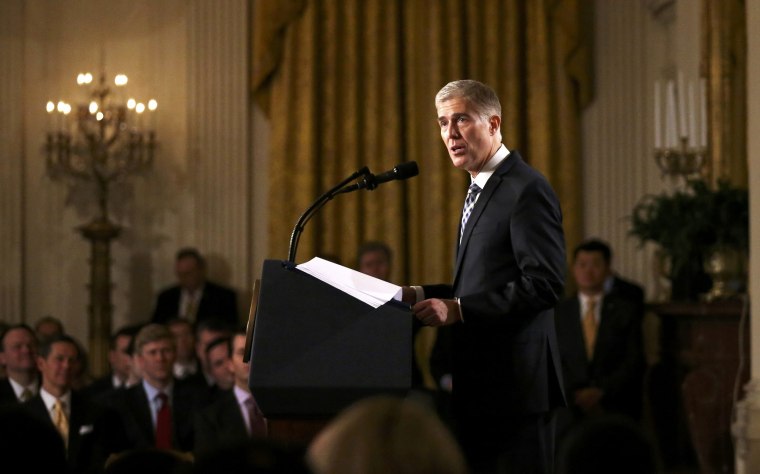For decades, the United States Supreme Court has been a beacon of hope for LGBTQ Americans. It has been our final recourse for justice when, too often, people in our community have been singled out for discrimination or targeted at the ballot box.
But today, the promise of the Supreme Court as a guardian of the rights of all Americans, especially LGBTQ Americans, is under threat. Donald Trump has nominated Neil Gorsuch to the Supreme Court, following through on a campaign promise to install a justice in the mold of the late Antonin Scalia — one of the most vehemently anti-LGBTQ justices in the history of our country.
The appointment of Neil Gorsuch will have profound consequences for LGBTQ people for generations to come. The historic Supreme Court decision extending marriage equality nationwide didn’t happen out of thin air; it was built upon decades of other crucial civil rights cases, including the Court’s 2013 ruling striking down the Defense of Marriage Act. And consider for a moment that both of these cases -- along with dozens of other civil rights cases throughout our history -- have come down to just one vote.
We must demand a Supreme Court Justice who embraces equal justice under law and who will apply a compassionate, impartial, and inclusionary interpretation of the Constitution faithful to its drafters’ vision. By his own admission, Neil Gorsuch is not that justice.
Importantly, our long march toward equality under the law has not only shaped our country’s understanding of personal autonomy and individual dignity, but also our relationship with the government and with each other.
In crafting the majority opinion in the historic Obergefell marriage equality case, Justice Anthony Kennedy cited Loving v. Virginia, the 1967 civil rights case that struck down anti-miscegenation laws. When Justice Kennedy wrote of marriage as a fundamental right, he relied on the Loving principle that “the right to personal choice regarding marriage is inherent in the concept of individual autonomy.”
This is precisely why it is so alarming that Neil Gorsuch has, throughout his career, refused to recognize the role of the courts in protecting individual and civil rights.
He has divided cases, issues, and plaintiffs into two distinct categories: those who deserve justice from the courts and those who don’t. He put this exclusionary vision of justice into action in 2013, joining a Tenth Circuit Court decision in the infamous Hobby LobbyStores, Inc. v. Sebelius case that ultimately gave many companies a broad license to discriminate based on religious beliefs.
That decision, which found that a closely held corporation should receive personhood-status for purposes of the Religious Freedom Restoration Act (RFRA), set the stage for the Supreme Court’s 2014 opinion in Burwell v. Hobby Lobby Stores, Inc., which expanded RFRA and broadened its ability to be used as a means to discriminate -- including against LGBTQ people.
That makes Gorsuch’s refusal to recognize the Constitutional rights of an actual person in the 2015 case Druley v. Patton all the more appalling. In that case, he dismissed the request of a transgender prisoner for basic, consistent health care and safe housing with other women.
Mr. Gorsuch not only stands by these rulings, he has dismissed efforts to protect civil rights through the courts by accusing progressives of being “addicted to the courtroom… as the primary means of affecting their social agenda.” During his confirmation hearings, all senators -- Democrats and Republicans alike -- must press Mr. Gorsuch to explain what recourse he would have felt entitled to if a county clerk denied him a marriage license or a school board barred his child from using the restroom at school.
Mr. Gorsuch’s record on civil rights and reflexive antipathy toward those who have no other choice but to seek justice through our courts is deeply troubling.
This is why, for the first time in the 37-year history of the Human Rights Campaign, we formally opposed Neil Gorsuch’s nomination prior to his Senate hearings. In our view, his anti-equality record -- from opposing crucial medical treatment for a transgender person to supporting a license to discriminate for private corporations -- is disqualifying.
We must demand a Supreme Court Justice who embraces equal justice under law and who will apply a compassionate, impartial, and inclusionary interpretation of the Constitution faithful to its drafters’ vision. By his own admission, Neil Gorsuch is not that justice.
Chad Griffin is the president of the Human Rights Campaign, the nation’s largest lesbian, gay, bisexual, transgender and queer (LGBTQ) civil rights organization.
